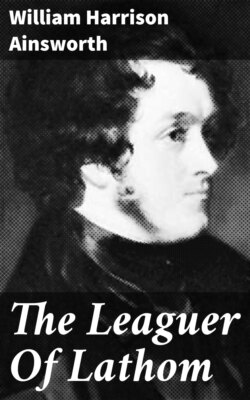Читать книгу The Leaguer Of Lathom - William Harrison Ainsworth - Страница 19
На сайте Литреса книга снята с продажи.
CHAPTER XVI
The Burning of Alport Lodge
ОглавлениеTable of Contents
ON that night, Lord Derby, whose head-quarters were at Alport Lodge, retired early to rest, being greatly fatigued.
Since the hall was well guarded he did not for a moment imagine it would be attacked, or if any such rash attempt should be made, he never dreamed it would prove successful.
Conceiving himself, therefore, in perfect security, he slept soundly, but was roused from his slumbers by shouts and the loud beating of a drum, followed by the discharge of musketry.
These alarming sounds announced that the foe was upon them, and springing from his couch, he proceeded hastily to attire himself, and had nearly completed his toilette, when Frank Standish rushed into the room, with dismay depicted on his countenance.
"You look scared," said the earl. "What has happened? Speak!"
"A sortie has been made from the town, my lord," replied Standish.
"But no harm has been done?" interrupted the earl.
"Much mischief, I grieve to say, has been done, my lord," rejoined Standish. "We have been taken by surprise. The enemy contrived to pass the sentinels unperceived."
"But they have been driven off?" cried the earl.
"They have, my lord. But they have succeeded in their aim. They have set fire to the hall."
"Set fire to the hall!" exclaimed the earl, rushing to the window, and looking forth. "Gracious heaven, it is so!"
"Every effort, I fear, to extinguish the fire will be unavailing, my lord," said Standish.
"I hope not," cried the earl. "'Twill be grievous, indeed, if this fine old mansion should be destroyed. That calamity must be prevented if possible. I will see to the work myself. Do not tarry here. Pursue the foe, and bring back all the prisoners you can."
Standish required no further orders, but hurrying off, mounted his horse, and accompanied by a party of troopers, rode swiftly towards the town—with what result has already been shown.
On descending to the lower part of the house, Lord Derby found the whole place in confusion.
Already the fire had made considerable progress, and the entrance-hall and passages were filled with smoke. Serving-men and soldiers were hurrying hither and thither; removing various articles under the direction of Sir Edward Mosley, who maintained the greatest composure at this trying juncture. When Lord Derby expressed his belief that the hall might yet be preserved, Sir Edward shook his head.
"Alas! no," he said. "The place is doomed."
The earl then went forth into the courtyard, where he found Sir Thomas Tyldesley, Sir Gilbert Gerard, Sir Alexander Radcliffe, Sir Gilbert Hoghton, Mr. Prestwich, and others, who were encouraging the soldiers in their efforts to extinguish the fire.
But it was evidently impossible to arrest the progress of destruction. The fire burnt swiftly, the building being old and dry, and constructed, as we have already explained, of wood and plaster.
The incendiaries had done their work well. They had set fire to some outbuildings, which quickly communicated with the mansion. One side of the quadrangle was entirely on fire, and the flames were extending rapidly. Unfortunately, no water could be procured.
By command of the Earl of Derby an attempt was made to pull down a portion of the building, but the flames advanced with such rapidity that it could not be accomplished. They had now reached the roof, and bursting forth, soared aloft, lighting up a portion of the park, and even illuminating the walls of the town, and the lofty tower of the Collegiate Church.
Viewed from the south walls, the spectacle of the burning mansion was exceedingly fine, and was contemplated by several hundreds of the inhabitants who looked upon it as an interposition of Heaven in their behalf. Even the Royalists themselves felt dismayed.
A new source of alarm now arose. Sir Edward Mosley suddenly recollected that a couple of barrels of powder were stowed away in a cellar beneath the house, and he gave orders that they should be immediately removed. Several soldiers were willing to make the hazardous attempt. But it was now too late. The fire had got so near the entrance that no one could descend into the cellar with safety. The only hope was that the barrels might escape the sparks.
However, since the risk was imminent, all the persons assembled in the court- yard, or on the terrace in front of the house, including the servants, men and women, were ordered to withdraw at once to a certain distance from the burning mansion.
The order was promptly obeyed. Everybody hurried off, and they had only just reached a place of safety when a tremendous explosion took place, completely destroying the house, scattering the burning fragments in every direction, and seeming to shake the very ground.
A grand, but terrible sight, it powerfully affected all the beholders. Lord Derby, who with Sir Edward Mosley, Sir Thomas Tyldesley, and the others, was standing at a distance, expressed his great concern.
"You will now have to seek a lodging elsewhere, my lord," observed Sir Edward Mosley.
"Come with me to Ordsall," said Sir Alexander Radcliffe.
"No, I shall not leave the spot," rejoined the earl, in a sombre voice. "As soon as it is dark I will attack the town."
"I am glad to hear it," remarked Sir Thomas Tyldesley.
The destruction of Alport Lodge was witnessed with exultation from the walls, where, as we have said, a great number of the townspeople were now gathered. Their rejoicing found expression in a hymn, in which so many voices joined, that it reached the ears of the Royalists.
Amongst those on the walls was Rosworm. But he was greatly troubled. His beloved daughter had disappeared, and no doubt had been carried off as a prisoner.
